|
|
|
Sort Order |
|
|
|
Items / Page
|
|
|
|
|
|
|
| Srl | Item |
| 1 |
ID:
096572


|
|
|
|
|
| Publication |
2010.
|
| Summary/Abstract |
Foreign aid involves a chain of accountability relationships stretching from international donors through national governments and implementing agencies to a set of ultimate end users of the goods and services financed by the aid. In this paper, I review five different accountability relationships that exist in foreign aid projects among donors, governments, implementing agencies and end users. Then I summarize existing empirical evidence demonstrating that foreign aid functions better-both at the macro-level of aid flows and at the micro-level of individual aid projects-when there is more government and implementing agency accountability. Specifying several mechanisms that facilitate accountability, I emphasize that participation is a tool often used to produce accountability within aid projects. However, in terms of donor accountability to aid-receiving countries and the end users in them, recent pushes for increased participation have not resulted in more accountability in the design of aid programs. Ultimately, although enthusiasm for participatory models of aid design and delivery is warranted, participation is not a panacea for all the accountability problems in foreign aid programs.
|
|
|
|
|
|
|
|
|
|
|
|
|
|
|
|
| 2 |
ID:
083624


|
|
|
|
|
| Publication |
2008.
|
| Summary/Abstract |
Abstract: The Millennium Development Goals (MDGs) are a set of international development targets agreed to by members of the United Nations in 2000. The goals aim to improve many of the dimensions of extreme poverty and are to be achieved by 2015. This paper provides an overview of the issues relevant to the achievement of the MDGs in the Asia-Pacific region. The paper begins by discussing the critiques of the MDGs before assessing whether countries in the region are on track to achieve them. Issues relating to data availability and accuracy are discussed and the need to tailor the MDG targets to the special circumstances of some Asia-Pacific countries is examined. The paper proceeds by discussing the role of international assistance via international foreign development aid and non-governmental organisations in the achievement of the MDGs. The paper concludes with some policy implications for the international donor community.
|
|
|
|
|
|
|
|
|
|
|
|
|
|
|
|
| 3 |
ID:
084430


|
|
|
|
|
| Publication |
2008.
|
| Summary/Abstract |
Abstract: The Millennium Development Goals (MDGs) are a set of international development targets agreed to by members of the United Nations in 2000. The goals aim to improve many of the dimensions of extreme poverty and are to be achieved by 2015. This paper provides an overview of the issues relevant to the achievement of the MDGs in the Asia-Pacific region. The paper begins by discussing the critiques of the MDGs before assessing whether countries in the region are on track to achieve them. Issues relating to data availability and accuracy are discussed and the need to tailor the MDG targets to the special circumstances of some Asia-Pacific countries is examined. The paper proceeds by discussing the role of international assistance via international foreign development aid and non-governmental organisations in the achievement of the MDGs. The paper concludes with some policy implications for the international donor community
|
|
|
|
|
|
|
|
|
|
|
|
|
|
|
|
| 4 |
ID:
091802
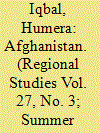

|
|
|
|
|
| Publication |
2009.
|
| Summary/Abstract |
Many problems that Afghanistan faces today are rooted in the legacy of its relationship with the international community. Weaknesses in governance, poor institution-building, absence of democracy, problems relating to its role in the war against terror and lack of accountability in foreign aid usage are some.
|
|
|
|
|
|
|
|
|
|
|
|
|
|
|
|
| 5 |
ID:
104786
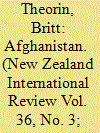

|
|
|
| 6 |
ID:
188648
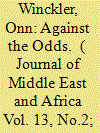

|
|
|
|
|
| Summary/Abstract |
Following independence, but particularly following the 1948–1949 Arab-Israeli War and more so in the wake of the assassination of King Abdullah I, a common prediction among both intelligence units and academics was that Jordan, at least in its initial form, namely as a sovereign political entity under the rule of the Hashemite family, would have a limited lifespan. These pessimistic projections were largely intensified following the June 1967 War and the Black September events. In retrospect, despite the high volatility of the Jordanian economy since the mid-1980s, and more so following the Iraqi invasion of Kuwait, Jordan is currently not only more politically stable than most of the other non-oil Arab countries, but also its socioeconomic situation is better. The aim of this article is twofold: first, to examine the major socioeconomic challenges that the Kingdom had to deal with that led so many to evaluate that it would not survive; and second, to explore the core socioeconomic pillars that enabled Jordan to survive. The core question that remains is, in light of the current major challenges – namely, the continuation of the Coronavirus pandemic; the continuing presence of large number of Arab Spring refugees; the ongoing instability in Syria and Iraq; the Kingdom’s high unemployment rate; and above all, the persistence of the rapid population growth – will the current rentier system work well “enough to survive” or, if not, what will the political consequences of failure be?
|
|
|
|
|
|
|
|
|
|
|
|
|
|
|
|
| 7 |
ID:
140331
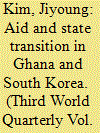

|
|
|
|
|
| Summary/Abstract |
This paper examines the questions of why and how foreign assistance was utilised successfully in South Korea but less so in Ghana, with a focus on the role of aid in the process of state building and state transition in these two countries. As multiple policy makers and scholars have noted, in 1957 South Korea and Ghana shared similar levels of GDP per capita, yet South Korea then achieved rapid economic development and democracy in one generation, while Ghana suffered from slow development and a general deterioration of the standard of living. In this study I adopt a comparative historical research method to explain the divergent paths of these two countries, with a special focus on the impact of foreign assistance on state transitions. I argue that contextual factors – including the effect of the colonial legacy in each of these two regions in shaping modern states, and the specific characteristics of foreign assistance intervention – provide useful insights in explaining the differential impact of aid on state building and state transition in Ghana and in South Korea.
|
|
|
|
|
|
|
|
|
|
|
|
|
|
|
|
| 8 |
ID:
158652
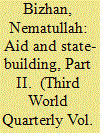

|
|
|
|
|
| Summary/Abstract |
Part I of this article found that, in South Korea and Taiwan, institutional legacy and continuity as well as the politics of aid did matter for post-war state-building. The inheritance and continuity of Weberian states and the receipt of aid either as budget support or increasingly aligned with local priorities helped to foster state-building. Part II of the study in this article explores a different dynamic of post-war aid to Afghanistan and Iraq which had a legacy of neopatrimonial and weak states. It argues that under more adverse initial conditions – for a neopatrimonial state – the role of aid regime and state-building strategies become even more important. Under these conditions, aid and state-building strategies may undermine state-building if they induce discontinuity in the existing state capacity and create parallel institutions to those of the state. Depending on the policies, state weakness may be reinforced if leaders are preoccupied with the politics of patronage.
|
|
|
|
|
|
|
|
|
|
|
|
|
|
|
|
| 9 |
ID:
089809
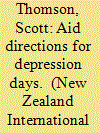

|
|
|
|
|
| Publication |
2009.
|
| Summary/Abstract |
The ortigin of NZAID lie in the need for expertise, experience, continuity and accountability in aid provision, These had been difficult to achieve under the old arrangements focused on the Ministry of Foreign Affairs' Aid Division. Most diplomats viewed aid work as a temporary distraction from diplomatic postings, not as a career choice. The establishment of a career service was designed to rectify this situation, rather than to ensure a political compromise in 2002. In aid provision there are no quich fixes.Fifty years of experience has shown how hard it is to generate life enhancing economic activity in the pacific islands. The government should tread warily in the field, and should not ignore voluntary sector experience. This article cricises the government's new approach to aid provision.
|
|
|
|
|
|
|
|
|
|
|
|
|
|
|
|
| 10 |
ID:
137727
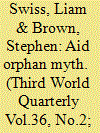

|
|
|
|
|
| Summary/Abstract |
The term ‘aid orphan’ refers to a developing country forgotten or abandoned by the development community. This metaphor has featured prominently in the development assistance policy and research literature over the past decade. Development practitioners, policy makers and researchers have defined aid orphans in manifold ways and often expressed concern over the potential fate or impact of such countries. In this paper we first examine the many definitions of aid orphans and then review the main concerns raised about them. Next we empirically examine more than 40 years of bilateral aid data to identify aid orphan countries and their common characteristics. Our findings suggest that very few countries meet the definition of aid orphan and fewer still raise the concerns collectively expressed about the orphan phenomenon. We conclude by suggesting researchers and practitioners abandon the orphan metaphor and instead focus on issues of equitable aid allocation.
|
|
|
|
|
|
|
|
|
|
|
|
|
|
|
|
| 11 |
ID:
051385
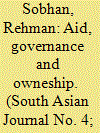

|
|
|
|
|
| Publication |
Apr-Jun 2004.
|
|
|
|
|
|
|
|
|
|
|
|
|
|
|
|
| 12 |
ID:
176382
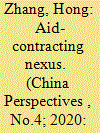

|
|
|
| 13 |
ID:
166388
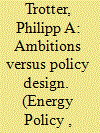

|
|
|
|
|
| Summary/Abstract |
Low energy access in sub-Saharan Africa has motivated the implementation of over 60 international electrification initiatives in the region. The US-led Power Africa initiative is one of the largest such efforts. Its central targets are to install 30 GW of additional capacity and create 60 million new connections to double electricity access by 2030. While Power Africa has received praise for its early achievements, an analysis of its targets and the rationale behind them reveals attributional, developmental and technical issues: Power Africa lacks a clear definition which criteria have to be met before African electrification projects can be counted towards fulfilling Power Africa's targets, the targets themselves appear to be too low to deliver on Power Africa's promises, and they exhibit several technical inconsistencies. Crucially, this paper argues that contrary to the Trump administration's intention to reduce its funds, Power Africa's targets and efforts need to be increased to meet the initiative's own ambitions.
|
|
|
|
|
|
|
|
|
|
|
|
|
|
|
|
| 14 |
ID:
177621
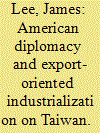

|
|
|
|
|
| Summary/Abstract |
Scholars have pointed to the period 1958-1962 as the beginning of Taiwan's transition to export-oriented industrialization. Although the Nationalist Party (KMT) had traditionally supported state socialism, the KMT began to oversee economic reforms in the late 1950s, setting Taiwan on the course of export-led growth under a capitalist model. Using archival materials from both the United States and Taiwan, I argue that the reforms resulted from U.S. influence on how the KMT understood the role of economic development in its grand strategy. U.S. arguments succeeded in creating political support at the highest levels of the KMT leadership for a reform-oriented faction in the economic bureaucracy. This finding shows how an aid donor can promote economic reforms even when the recipient is strategically important for the donor: although threats to enforce conditionality may not be credible, the donor can influence the recipient through persuasion.
|
|
|
|
|
|
|
|
|
|
|
|
|
|
|
|
| 15 |
ID:
098380
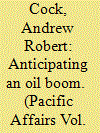

|
|
|
|
|
| Publication |
2010.
|
| Summary/Abstract |
By mid-decade, Cambodia will likely begin production of offshore oil fields containing an estimated 700 million to two billion barrels of oil and significant quantities of natural gas. This long anticipated event has prompted considerable discussion of whether petroleum-derived wealth will be a blessing or a curse. Much of the discussion has been framed through the lens of the "resource curse" thesis. The purpose of this article is to consider how the notion of a resource curse has entered the Cambodian political arena and to examine the questions it has prompted Cambodia's ruling elite and external actors to ask concerning the management of petroleum resources. Based on a systematic examination of the evolution of government policy, and of external attempts to shape its development, I show how warnings of a "resource curse" have come to be deployed in different ways by reform promoting aid donors, civil society groups, and the ruling elite. The article concludes by noting that while these warnings have helped to highlight risks associated with the rapid exploitation of petroleum resources, little will or capacity exists either domestically or internationally to transcend technical fixes to the pathologies of petroleum revenue wealth and to press for a more transparent exploitation regime.
|
|
|
|
|
|
|
|
|
|
|
|
|
|
|
|
| 16 |
ID:
186491
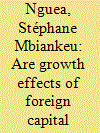

|
|
|
|
|
| Summary/Abstract |
Sub-Saharan Africa's electrification rate of 45% in 2018 remains extremely low compared with other developing regions. This study investigates if foreign capital could significantly contribute to enhancing the electricity access rate in Africa, a subject so far neglected in the literature. Specifically, it seeks to know whether increasing FDI, remittances and foreign aid matter for access to electricity in Africa. We utilize a dynamic panel System-Generalized Method of Moments (Sys-GMM) estimator to analyse data collected on a panel of 36 African countries over 2000–2017. The empirical findings show that FDI and remittances are positively and significantly related to increasing access to electricity. Moreover, our results show that foreign aid reduces the electricity access. We finally find that remittances reduce urban-rural disparities in access to electricity, while FDI and foreign aid increase disparities. These results remain consistent when we perform sub-regional analyses, suggesting that African countries should rely more on remittances and FDI to promote universal access to electricity.
|
|
|
|
|
|
|
|
|
|
|
|
|
|
|
|
| 17 |
ID:
171009
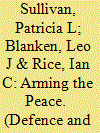

|
|
|
|
|
| Summary/Abstract |
What are the effects of foreign security assistance on the quality of the peace in post-conflict countries? Despite the stakes, and the tremendous amount of weaponry and other forms of foreign military aid flowing to governments of post-conflict countries, the academic literature provides little guidance as to what effects policymakers and practitioners should expect from this type of aid. Military assistance provided to the government of a country emerging from the turmoil of civil war could enable the state to establish a monopoly on the legitimate use of force, leading to a more durable peace and greater human security. However, we contend that significant flows of military aid and weapons from foreign governments may encourage regimes to adopt more repressive approaches to governance. We investigate the impact of security assistance on human rights conditions after 171 internal armed conflicts that ended between 1956 and 2012 using a novel measure of military aid and an instrumented measure of weapons transfers. We find strong evidence that both military aid and arms transfers to post-conflict governments increase state repression.
|
|
|
|
|
|
|
|
|
|
|
|
|
|
|
|
| 18 |
ID:
147640


|
|
|
|
|
| Summary/Abstract |
In the decade preceding the election of the Abbott Coalition Government in 2013, a so-called ‘golden consensus’ governed Australian aid policy. During this period Australia’s aid spending increased by over 80% in real terms. However, after winning government the 2013 Federal Election, the Abbott Government made a series of significant and unexpected aid policy decisions, cutting the aid budget three times in fifteen months and integrating AusAID, Australia’s aid agency, into the Department of Foreign Affairs and Trade. This article considers the future role of aid in Australia’s diplomacy primarily by engaging with a prior question: how was it possible for the golden consensus to be uprooted so easily? Conducting a post-mortem reveals that Australia’s development constituency bears some responsibility for the fragility of the consensus. This analysis also reveals the critical role the development constituency will play in determining the extent to which Australia is able to embrace the ‘beyond aid’ agenda. To meet this contemporary challenge, the development community must heed the lessons of the collapse of the golden consensus and, in particular, overcome its reticence to engage in broader foreign policy debates.
|
|
|
|
|
|
|
|
|
|
|
|
|
|
|
|
| 19 |
ID:
076919
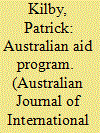

|
|
|
|
|
| Publication |
2007.
|
| Summary/Abstract |
The Australian government's White Paper on aid provides a blue print for the Australian aid program for the next decade. While it ostensibly has a focus on poverty, it still sees economic growth and effective government as the path to poverty reduction. This article analyses and highlights the issues associated with this approach to poverty. These are: growing inequality and vulnerability, the rural-urban divide in poverty outcomes, and increasing social exclusion leading to increasing social and political insecurity. The article then examines the alternative policies adopted by the British aid agency, DFID, and concludes with some suggestions on how the practice of the Australian aid program can better match the goal of poverty reduction
|
|
|
|
|
|
|
|
|
|
|
|
|
|
|
|
| 20 |
ID:
091978
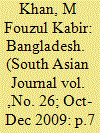

|
|
|
|
|
| Publication |
2009.
|
| Summary/Abstract |
The global recession could not have come at a less inopportune time for Bangladesh.The economy suffered shocks on both domestic and foreign fronts in FY08'. Domestically Bangladesh experienced two rounds of floods and was hit by the catastrophic major cyclone Sidr' which resulted in a huge loss of life and destruction of infrastructure, property and crops.
|
|
|
|
|
|
|
|
|
|
|
|
|
|
|
|
|
|
|
|
|